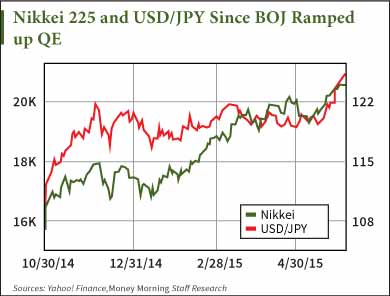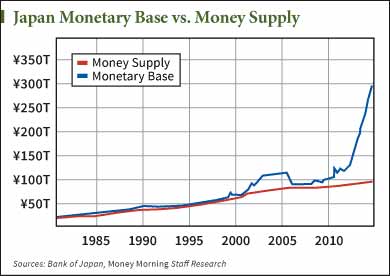 The Japanese stock market right now is a textbook case of irrational exuberance and central bank stock market manipulation.
The Japanese stock market right now is a textbook case of irrational exuberance and central bank stock market manipulation.
The weakening yen is much of the same.
The Nikkei 225, the leading Japanese stock market benchmark, is up 31.2% since the Bank of Japan announced it was going to ramp up its already existing quantitative easing campaign by another ¥10 trillion ($80.2 billion) a year.
And the dollar has appreciated against the yen 13.5%.
However, the mechanics of quantitative easing don't really support this kind of movement in either market.
As the old axiom goes, "The markets can remain irrational longer than you can remain solvent." And right now, the Japanese stock market and the yen are stubbornly irrational.
Here's why...
The Real Story Behind the Japanese Stock Market and Weakening Yen
The soaring Japanese stock market is creating a "wealth effect" that masks the true tragedy befalling the Japanese consumer right now. While the Nikkei 225 recently established new 15-year highs, consumer spending has continued to shrink. The country's population is aging, not spending.
And the falling yen is not because of the BOJ's monetary policy. Traders have hammered the Japanese yen in a speculative attack - selling yen and buying dollars.
To understand why QE isn't working, you have to understand how it is intended to function...
QE is often mistakenly viewed as a "helicopter drop" of money on the economy or "money printing." But it's neither.
Here's how the Bank of Japan's QE works...
Commercial banks are required to hold reserves. This is either in vault cash or deposits held at the central bank or other banks. These reserves show up as an asset on the balance sheet for commercial banks. Also on the asset side of the commercial bank balance sheet are its bond holdings.
The BOJ will remove a Japanese government bond (or another qualifying asset under the current program) from a commercial bank's assets. So, the commercial bank's assets will be debited the value of the bond, and that will be credited to the BOJ's assets.
Then the BOJ will credit the commercial bank's reserves the value of those bonds. Those added reserves will become a liability of the BOJ but an asset to replace the bond for the commercial bank.
This is not money printing. It's an asset swap.
The BOJ only rearranges the composition of the commercial bank's balance sheet, and it is all done with simple computer keystrokes on an electronic spreadsheet.
The BOJ's balance sheet does expand, but the bank does not truly create new money. If anything, it could be billed as "reserve printing," but that is hardly the same thing.
That's because bank reserves do not enter the private economy. Banks draw on these for the purpose of lending to other banks. And while there are reserve requirements, banks aren't constrained in their lending by them. They can make as many loans as they want and then obtain (rather easily) reserves in the interbank market after the fact.
The only thing constraining loans are capital requirements and loan demand. And with household consumption falling the last four quarters in Japan, it's becoming increasingly obvious that the Japanese consumers aren't lining up for loans.
If anything, QE in Japan adds deflationary pressures to the economy that don't support the current devaluation.
When a central bank floods the financial system with reserves, it pushes down rates for banks to acquire reserves in the interbank market. This will spark an economy-wide drop in interest rates as banks will lower rates on their own loans to attract more demand while they play the spread between their own lending and the interbank market.
But Japanese consumers aren't taking out loans large enough to expand the money supply in a meaningful way that would stoke inflation. And as all that is happening, the BOJ is pushing interest rates lower, which actually removes yen from the private economy in the form of falling interest income.
Now, here's why the yen and the Japanese stock market are not responding accordingly...
Why QE Doesn't Cause Inflation
 There's a profound misunderstanding of what the monetary base is and what the money supply is. That lies at the heart of this notion that QE is inflationary.
There's a profound misunderstanding of what the monetary base is and what the money supply is. That lies at the heart of this notion that QE is inflationary.
QE increases monetary base, which is the sum of all currency in circulation and reserve balances. The money supply is the actual currency in circulation, whether that's cash or coins or demand deposits.
Money supply is what determines inflation. If the amount of currency in circulation outpaces the economy's productive capacity to create goods and services, that sparks inflation. In other words, "too many dollars (or yen) chasing too few goods."
But because loan demand is soft in Japan, the money supply isn't increasing nearly as much as the monetary base. And if there aren't enough transactions in the private economy, then there can be no inflation.
[epom key="ddec3ef33420ef7c9964a4695c349764" redirect="" sourceid="" imported="false"]
Speculators have been selling yen to buy dollars on the false premise that an increase in monetary base sparks inflation. And while this will weaken the yen in currency markets, it doesn't mean inflation is going to come on the backs of blossoming consumer demand.
The BOJ is more than welcoming of this bearish sentiment because it fuels export-driven growth. But it does nothing to reverse the troubling deflationary trend that's plagued the Japanese economy now for two decades.
And likewise, as interest rates in Japan continue to feel relentless downward pressure, it's pushing investors out of risk-free debt and into the asset markets in search of higher yields. That's what's behind this Japanese stock market rally.
But once again, the Nikkei isn't soaring because Japan is better off.
It's all a game by the central bank to paper over its real troubles through phony "wealth creation."
Jim Bach is an Associate Editor at Money Morning. You can follow him on Twitter @JimBach22.
The Fed is playing the same game here in the United States... QE does nothing to kick-start the economy, yet the stock market has wildly overreacted to this monetary policy as if this were the case. Here's why we know the Fed's policy is none other than a ruse to paper over the real problems in the U.S. economy...


